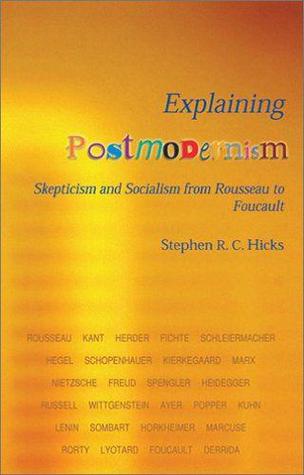More on this book
Community
Kindle Notes & Highlights
Read between
June 20, 2017 - June 13, 2018
But by encouraging those irrationalisms the new revolutionaries can destroy the system. So
overthrow the authority of the bourgeois class, the humiliated population has reason to institute a brief period of terror and to assault bodily a handful of contemptible, hateful individuals. It is difficult to attack the authority of a class without a few heads belonging to members of this class being paraded on the end of a stake.
And if one’s epistemology tells one that words are not about truth or reality or in any way cognitive, then in the battle against capitalism words can be only a rhetorical weapon.
There is no non-linguistic standard to which to relate language, so there can be no standard by which to distinguish between the literal and the metaphorical, the true and the false.
Unmasking does not even terminate in “subjective” beliefs and interests, for “subjective” contrasts to “objective,” and that too is a distinction that postmodernism denies.
For the postmodernist, language cannot be cognitive because it does not connect to reality, whether to an external nature or an underlying self.
This explains the harsh nature of much postmodern rhetoric. The regular deployments of ad hominem, the setting up of straw men, and the regular attempts to silence opposing voices are all logical consequences of the postmodern epistemology of language.
going with their feelings. On this hypothesis, then, postmodernism is a symptom of the far Left’s crisis of faith.
Postmodernism is a result of using skeptical epistemology to justify the personal leap of faith necessary to continue believing in socialism.
Therefore, it is a combination of the two factors—widespread skepticism about reason and socialism’s being in crisis—that is necessary to give rise to postmodernism.
One could, after doing some philosophy, come to be a true believer in subjectivism and relativism.
that justice is the interest of the stronger. The postmodernists—coming after two millennia of Christianity and two centuries of socialist theory—simply reverse that claim: Subjectivism and relativism are true, except that the postmodernists are on the side of the weaker and historically-oppressed groups. Justice, contrary to Thrasymachus, is the interest of the weaker.[298] The connection to the Sophists moves postmodern strategy away from religious faith and toward realpolitik.
The same strategy holds for the Machiavellian postmodernists—they say they want equal respect for all cultures, but what they really want in the long run is to suppress the liberal capitalist one.
Deconstruction allows you to dismiss whole literary and legal traditions as built upon sexist or racist or otherwise exploitative assumptions.
On this Machiavellian hypothesis, then, postmodernism is not a leap of faith for the academic Left, but instead a clear-eyed political strategy that uses relativism but does not believe
Slave morality is the morality of the weak, the humble, those who feel victimized and afraid to venture forth into the big bad world.
They become envious of the strong, and they also secretly start to hate themselves for being so cowardly and weak.
And so the weak invent a rationalization—a rationalization that tells them they are the good and the moral because they are weak, humble, and passive.
And the confidence in the power of reason that underlies it all has, from the postmodernists’ perspective, been revealed to be a fraud. The thought of nuclear weapons in the clutches of an irrational, grasping animal is frightening.
The failure of Left politics to achieve that vision was merely the last straw. To the postmodern mind, the cruel lessons of the modern world are that reality is inaccessible, that nothing can be known, that human potential is nothing, and that ethical and political ideals have come to nothing.
Rauschenberg. Deconstruction theory says that no work has meaning. Any apparent meaning can be transformed into its opposite, into nothing, or revealed to be a mask for something distasteful.
If a text can mean any-thing, then it means nothing more than anything else—no texts are then great.
psyche. You know that those accusations and rumors will cause tremors, even if they come to nothing.


